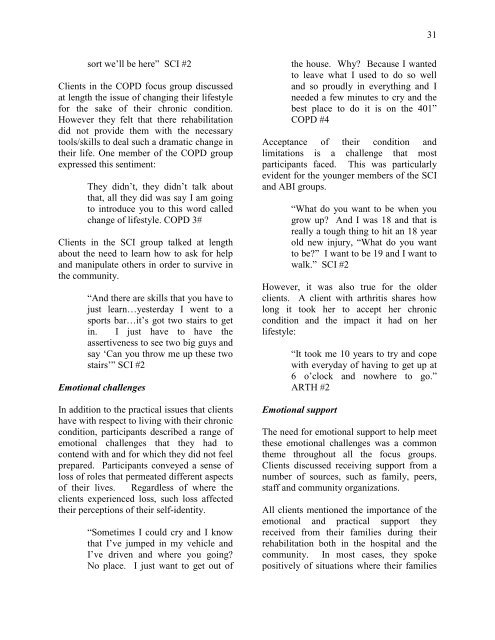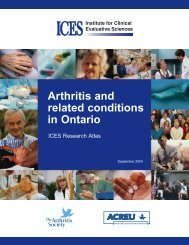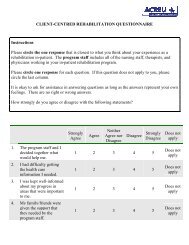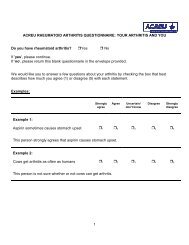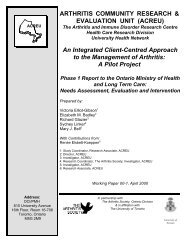Client-Centred Rehabilitation - Arthritis Community Research ...
Client-Centred Rehabilitation - Arthritis Community Research ...
Client-Centred Rehabilitation - Arthritis Community Research ...
Create successful ePaper yourself
Turn your PDF publications into a flip-book with our unique Google optimized e-Paper software.
31<br />
sort we’ll be here” SCI #2<br />
<strong>Client</strong>s in the COPD focus group discussed<br />
at length the issue of changing their lifestyle<br />
for the sake of their chronic condition.<br />
However they felt that there rehabilitation<br />
did not provide them with the necessary<br />
tools/skills to deal such a dramatic change in<br />
their life. One member of the COPD group<br />
expressed this sentiment:<br />
They didn’t, they didn’t talk about<br />
that, all they did was say I am going<br />
to introduce you to this word called<br />
change of lifestyle. COPD 3#<br />
<strong>Client</strong>s in the SCI group talked at length<br />
about the need to learn how to ask for help<br />
and manipulate others in order to survive in<br />
the community.<br />
“And there are skills that you have to<br />
just learn…yesterday I went to a<br />
sports bar…it’s got two stairs to get<br />
in. I just have to have the<br />
assertiveness to see two big guys and<br />
say ‘Can you throw me up these two<br />
stairs’” SCI #2<br />
Emotional challenges<br />
In addition to the practical issues that clients<br />
have with respect to living with their chronic<br />
condition, participants described a range of<br />
emotional challenges that they had to<br />
contend with and for which they did not feel<br />
prepared. Participants conveyed a sense of<br />
loss of roles that permeated different aspects<br />
of their lives. Regardless of where the<br />
clients experienced loss, such loss affected<br />
their perceptions of their self-identity.<br />
“Sometimes I could cry and I know<br />
that I’ve jumped in my vehicle and<br />
I’ve driven and where you going?<br />
No place. I just want to get out of<br />
the house. Why? Because I wanted<br />
to leave what I used to do so well<br />
and so proudly in everything and I<br />
needed a few minutes to cry and the<br />
best place to do it is on the 401”<br />
COPD #4<br />
Acceptance of their condition and<br />
limitations is a challenge that most<br />
participants faced. This was particularly<br />
evident for the younger members of the SCI<br />
and ABI groups.<br />
“What do you want to be when you<br />
grow up? And I was 18 and that is<br />
really a tough thing to hit an 18 year<br />
old new injury, “What do you want<br />
to be?” I want to be 19 and I want to<br />
walk.” SCI #2<br />
However, it was also true for the older<br />
clients. A client with arthritis shares how<br />
long it took her to accept her chronic<br />
condition and the impact it had on her<br />
lifestyle:<br />
“It took me 10 years to try and cope<br />
with everyday of having to get up at<br />
6 o’clock and nowhere to go.”<br />
ARTH #2<br />
Emotional support<br />
The need for emotional support to help meet<br />
these emotional challenges was a common<br />
theme throughout all the focus groups.<br />
<strong>Client</strong>s discussed receiving support from a<br />
number of sources, such as family, peers,<br />
staff and community organizations.<br />
All clients mentioned the importance of the<br />
emotional and practical support they<br />
received from their families during their<br />
rehabilitation both in the hospital and the<br />
community. In most cases, they spoke<br />
positively of situations where their families


